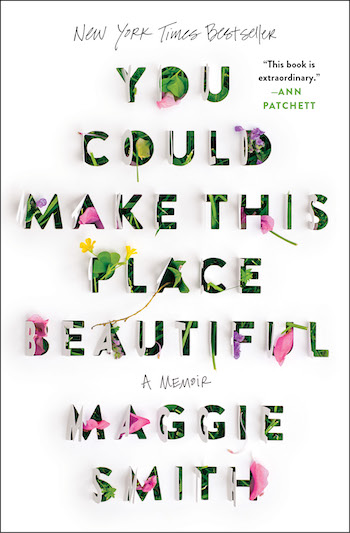Author Interview: Talking with Award-Winning Poet and Essayist Maggie Smith
By Blake Maddux
The inciting action of Maggie Smith’s moving memoir is the event that forced her to reckon with the fact that her marriage was in trouble.
For as long as I have known her, Maggie Smith has aspired to be a poet.
And I have known her since we were students together at Ohio Wesleyan University between 1995 and 1998. (I graduated in the latter year, she did so in 1999.)
The fact that she has succeeded can be measured in myriad ways, including simply being published, winning a prize for her first collection of poems, and being awarded a National Endowment for the Arts fellowship.
And this was all before her 2016 poem “Good Bones” went viral, was featured on a Madam Secretary episode of the same name, and was read aloud at the Lincoln Center by identically initialed Meryl Streep, who clarified that its author was “Not that one. The American.”
Since 2020, the woman with whom I shared one class with at OWU has published three consecutive bestsellers: 2020’s Keep Moving: Notes on Loss, Creativity, and Change, Goldenrod: Poems, and last year’s You Could Make This Place Beautiful: A Memoir, the paperback version of which will become available the day before her June 5 visit to Brookline Booksmith.
The inciting action of Smith’s moving memoir is the event that forced her to reckon with the fact that her marriage was in trouble. (Note: Although he is unnamed in the book, I also knew him from college, even though I am pretty sure that we never made eye contact let alone spoke to each other.)
From there, the already present challenge of being a mother, poet, and individual human being becomes amplified as all things do when something so integral to one’s life suddenly begins to crumble.
I recently spoke to my former college acquaintance (to be honest, we were not exactly close buddies who ran in the same social circles) for the first time in 25 years via Zoom.
The Arts Fuse: Was this book emotionally or mentally difficult for you to write?

Maggie Smith: Actually, it wasn’t that difficult to write, emotionally. It was difficult to figure out the shape and form of it and how I wanted to assemble the narrative: where to begin, where to end, where to take the reader in between. Emotionally, it was more difficult to live than to write, but there is something really satisfying about taking an experience that feels amorphous and giving it a shape on the page. Writing this was a way for me to look at all the ways the pieces of my life touched.
AF: Did you pitch this memoir or did a publisher propose it to you?
MS: It was not something that I thought I would write, but then it became the thing that I was living that I couldn’t not write. So I proposed it. The story just felt like a large piece of furniture that was in the way, and I wasn’t going to be able to write about the things in the margins of my life without staring at the thing that was sort of all-consuming. Once I cleared that out of the way, I could write other books.
AF: What are some of the most common criticisms of the book that you have dealt with?
MS: There are those who don’t like the structure of the book or the narrative style. I heard from many more people who are, like, enthusiasts (laughs) about those things. I knew that the choices that I was making were pretty strong-flavored choices and would be either love it or loathe it. I anticipated that, so it doesn’t bother me.
As far as criticism about having published a book about one’s life, I think that’s something that all memoirists deal with. There’s always going to be someone — especially if you’re a woman and especially if you’re a mother, who says, ‘Why did you have to air your dirty laundry?’ I address that in the book. I sort of wrote the counter position in these little mini-debates in the book itself, as if to say, ‘I know what you’re going to say and here’s my response.’
AF: How about the same question for praise?
MS: Most of the time when I get mail or emails or DMs, all most all of them begin with, I’ve never reached out to an author like this before. So I think there’s something about this book, and the experiences it describes that are drawing people out of their shells and making them hunt me down and find my email. The best praise is how something that I wrote about in this book resonates with any given person.

Maggie Smith. Photo: Devon Albeit Photography
AF: I presume that most of the feedback that you get is from women. Have you heard from any men?
MS: Some of the most impactful messages that I’ve gotten have been from men. One who was a doctor said that he read the book and realized that he needed to have conversations with his wife about her dreams and goals so that they had a better balance. If people can have these conversations early enough to course correct, I think that’s great.
AF: How did the last line of “Good Bones” come to serve as the title?
MS: I have such and ambivalent relationship with that poem. It pains me that most people encounter that poem because of tragedy. When I was thinking about words or phrases for this book, I had two in mind, one was a Tom Waits lyric, “A palace for sure.” [from his song “House Where Nobody Lives.”] But the line at the end of “Good Bones” is kind of a directive, and maybe it will help people find their way to this poem for the first time outside of a school shooting or a terrorist attack. That has happened, and it makes me feel happy for the poem.
AF: Of all the celebrities to read your poem aloud publicly, you could do a lot worse than Meryl Streep, who clarified that you were “not that one, the American.” What if the English Maggie Smith were to do the same?
MS: I think it would be a weird kind of worlds colliding supernova. (laughs) I don’t think that’s actually allowed to happen in the world. It would thrill me to no end, but Meryl Streep gave me something to use for my social media bio forever: “Not that one.”
AF: Which songs and which artists would be included if this book had a playlist?
MS: It does! There is a public playlist that I made for this book. I’ve made a playlist for all of my books, except the children’s book, that I’ve written in the past few years. [For the record, I did not know this when I asked the question.]
AF: Cool! So why those specific songs?
MS: I talk in the book about finding my way back to my pre-marriage factory settings. I realized that I was listening to a lot of early to mid-‘90s indie rock after my marriage ended, and I realized that was because that was the music I loved before. I didn’t do that consciously, but I was trying to remind myself of the version of me that pre-dated this long relationship. So if you find me wandering around the neighborhood with my Air Pods in, there’s a decent chance that I’m listening to Pavement or Superchuck or Nada Surf or The Replacements. These are like my forever favorite bands. The Mountain Goats’ “Picture of My Dress,” of course that’s on the list. You can’t tweet something snarky about your wedding dress and then have someone write a song inspired by it and the not put that on the playlist.
AF: How — I ask with tongue in cheek — do you deal with the demands of being a famous poet?
MS: Even if you would agree with the label “famous poet,” it’s sort of an oxymoron. It’s different from being an actor or a musician or being in a more visible art. It’s not really fame. I can go to Target. (laughs) There are no paparazzi. There are perks, but I can move in the world. I would categorize it as a wider readership, not as fame, and a wider readership is a wonderful thing. Feeling like when you write something more people will see it than saw the last thing that you made, that’s what we are always hoping for.
Blake Maddux is a freelance journalist who regularly contributes to the Arts Fuse, Somerville Times, and Beverly Citizen. He has also written for DigBoston, the ARTery, Lynn Happens, the Providence Journal, The Onion’s A.V. Club, and the Columbus Dispatch. A native Ohioan, he moved to Boston in 2002 and currently lives with his wife and six-year-old twins — Elliot Samuel and Xander Jackson — in Salem, MA.
